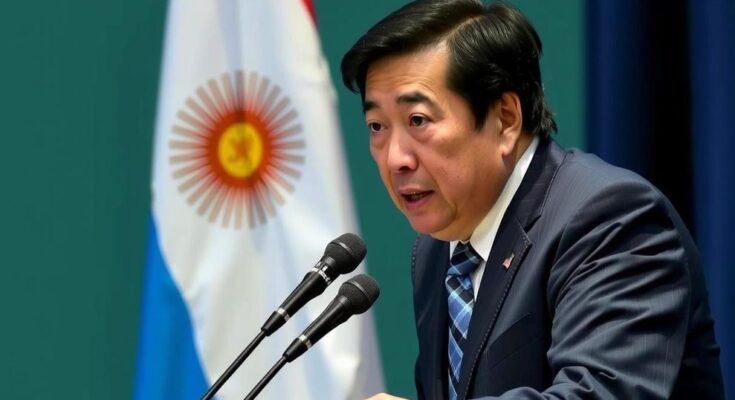President Javier Milei has dismissed Diana Mondino as Argentina’s Foreign Minister after the country voted at the UN to lift the US embargo against Cuba. Gerardo Werthein has been appointed as her successor. The decision underscores the tensions between Argentina’s need for support from Cuba and its allies versus traditional relations with the US and Israel.
On Wednesday, President Javier Milei terminated the appointment of Argentina’s Foreign Minister, Diana Mondino, following the nation’s decision to vote at the United Nations in favor of lifting the long-standing US embargo on Cuba. The presidency confirmed that Mr. Gerardo Werthein will assume the role of foreign minister; Werthein previously served as Argentina’s ambassador to the United States. In a significant vote, Argentina joined 186 other UN member states supporting the resolution against the embargo that has been in place since 1962, with only the United States and Israel voting against it, while Moldova opted to abstain. In light of Mondino’s dismissal, President Milei promptly shared a statement from a lawmaker expressing pride in a government that refrains from backing dictators, endorsing the hashtag “Viva CubaLibre.” Historically, Argentina has opposed the embargo, yet the current administration faces a dilemma, as certain diplomatic sources indicated that garnering support from Cuba and its allies might be pivotal for Argentina’s future discussions concerning sovereignty claims over the Falkland Islands, a British territory.
The U.S. embargo against Cuba has been a contentious issue in international relations for over sixty years, stemming from geopolitical tensions during the Cold War era. Argentina, under various administrations, has shifted its stance on this matter, and President Milei’s recent dismissal of the foreign minister demonstrates the delicate balance the government seeks to maintain between historical alliances with the U.S. and Israel and relationships with other nations influenced by the embargo. As a nation that frequently votes with the majority of UN member states opposing the embargo, Argentina’s government finds itself at a crossroads as it navigates these diplomatic waters, particularly concerning its claim over the disputed Falkland Islands.
In summary, President Javier Milei’s decision to dismiss Foreign Minister Diana Mondino is a clear reflection of the political ramifications following Argentina’s vote to lift the US embargo on Cuba. The appointment of Gerardo Werthein is indicative of a strategic shift in foreign policy, highlighting the complexities and sensitivities associated with international relations, especially regarding Argentina’s historical conflicts over territory and sovereignty.
Original Source: www.barrons.com




